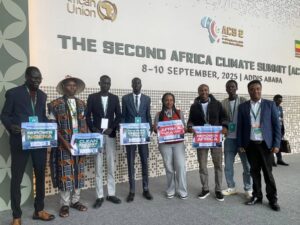Africa requires over $3 trillion to meet its 2030 climate goals but has received only $30 billion between 2021-2022, marking a shortfall of between $200-250 billion annually.
This is part of the report from the Second Africa Climate Summit (ACS 2), held in Addis Ababa, Ethiopia, from 8th – 10th September 2025.

The Summit, which ended with significant commitments and strategic declarations that position Africa as a leader in climate global action, could still not raise funds sufficient to close the gap in funding entirely.
The summit brought together heads of state, financial institutions, and climate leaders to forge unprecedented partnerships. It also served as a crucial platform for Africa to unify its voice ahead of COP 30 in Brazil.

Some of the initiatives aimed at financing climate change adopted at the summit include the African Climate Innovative Compact (ACIC) and the Africa Green Industrialization Initiative (AGII).
African leaders agreed to invest $50 billion in catalytic finance in ACIC to promote climate solutions across the continent.
This ambitious initiative targets five critical sectors of energy, agriculture, water, transport, and resilience.
It targets renewable energy projects and grid modernisation initiatives, sustainable water systems and conservation projects, climate-smart farming and food security technologies, and clean mobility and sustainable logistics networks.

For the AGII, a $100b billion landmark cooperation agreement was made, bringing together the continents leading financial institutions in an unprecedented partnership.
Key development banks suh as African Development Bank, Afrexim Bank,Africa 50, and African Finance Corporation (AFC), as well as four commercial banks- KCB Group,Equity Bank, Standard Bank Kenya, and Ecobank are expected to mobilize funds for the funds that will be facilitated under the Africa Free Trade Area (AfCTA) Secretariat.
The key focus area of the fund is renewable energy- powered industrial clusters, new value chains in critical minerals, green fuel production capacity, and battery manufacturing across the continent.
The summit adopted the Addis Ababa Declaration on Climate Change and Call To Action, which represents a significant evolution from the 2023 Nairobi Declaration and marks Africa’s transformation from climate victim to solution leader.
The summit positioned Africa as a global climate solution provider rather than just a vulnerable continent. It urged for a strong focus on adaptation, resilience, and nature-based solutions for climate challenges while emphasising predictable, fair climate finance and equitable global climate action and called for climate finance in grants and not loans to avoid worsening debt burdens.




